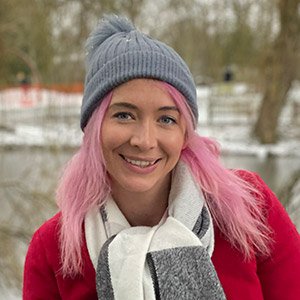17 January 2024
Lucy Campagnolo is the co-author (with Richard Fairgray) of graphic novels Cardboardia 1: The Other Side of the Box and Cardboardia 2: This Side Up. She lives in London where she works in film and television but was home in Aotearoa for a few weeks over the holidays. I was lucky enough to get an hour of her time to chat about the books and the collaborative writing process across time zones that got them written.

Kate:
Cardbordia is a unique world. What inspired it?
Lucy:
Richard and I had been wanting to do something together for a while and we were talking one day, and he'd come up with this idea of a world that is really tangible for everyone to access. No restriction on how to get into it. A lot of the fantasy worlds we see, something needs to be special about that child to get into the world and we wanted it to be something much more accessible. So something as simple as a carboard box being able to take you to a whole other place. When you're a kid, a cardboard box can be anything, so we're kind of just building on the magic of that.
When we were writing there were so many different versions of what the world is, or what it could be, and how we wanted it to work. So it came from us wanting to see how that could go, and we really wanted to do something together so we decided to explore that. We often bounce ideas off each other, but this is the one that really stuck.
Kate:
Story or artwork first? Or do they develop simultaneously?
Lucy:
Usually the story. Richard will always have the idea all the way through, which is why I really like working with him. Obviously, my background is in film and TV stuff, and there's a lot of similarities, but writing can be quite different. So when we're talking about ideas and going through the plot he’s really good at identifying what won't come across well on the page. Whereas you know something with movement or a moment of stillness that you create on a screen, on the page looks quite different, and Richard has a great eye for that. So we always build the stories first, and we figure out our beat points then flesh it out and he'd be able to visualise how that would go. As we go we have these little moments where we talk about the different ways we want to fill a scene or little things about a character. We go off on a tangent and then it's really cool when you start putting it together and you can see where those little side conversations fit in. That’s why I like working with him. I love a good story, but the way Richard can build a world just blows my mind!
Kate:
And so he does the illustrations?
Lucy:
Richard does all the illustrations. He’s been drawing from the womb, I think!
Kate:
Is there any character that you strongly identify with within the world?
Lucy:
I always love Pokey. I think because she’s the youngest daughter and gets pushed aside by the older kids. Well, not all of them.... I‘m the youngest of three girls and all the older kids would be off doing something and I’d be in my own little world. I also like how she sees the world as well though. She isn’t afraid to do things her own way which I really value. I think all four of them have some really cool things that they bring through that I think everyone can connect with whether they feel heard or if you’re an adult and seeing something in your own child. Things you might be aware of from when you were younger. There’s a lot you can play with in there. And all the characters were named after dogs, and Pokey was my dog, so of course she’s my favourite.
Kate:
What's the most rewarding thing about working on the series?
Lucy:
I love getting to work with Richard. We’ve done another book since then and just being able to build our creative vocabulary together has been really cool. And how the books have connected with people and hearing that people have read it. I love that part of it, sharing stories and then hearing people’s ideas and how different parts touch different people. It’s crazy to think about actually getting a book published.
Kate:
Tell me about the process of getting published.
Lucy:
Richard already had a connection with Pixel & Ink. We originally didn’t want it to be a comic. It was going to be a chapter book. And then we worked through different ideas, different versions of it, and we realised it was a comic. Richard had the relationship with the agency and they ran with it. It’s been an interesting experience. We’ve done something independent as well and there’s such a difference in the capacity to control the conversation with a publisher. It’s been really interesting, especially coming from the screen industry. There are so many similarities but also so many differences with the publishing world.
Kate:
Are there going to be any more Cardboardia books?
Lucy:
I’m looking at other things at the moment. But also trying to balance your life right? It’s a challenge to make sure you've got the creative output, but then there’s all the other things you have to get through in a day. I try to do a bit of writing here and there, but since I’ve come to London it’s fallen away a bit. In fact, since the world opened up post-COVID… Richard and I did so much of our writing during COVID, working across different time zones as well. I was in London and Richard was between LA and Canada, so there were so many different things going on in all the different areas and having to manage personal lives as well. There was a lot going on and this was a really nice form of escapism for us. But now of course we have all our other responsibilities and it’s harder to find that space. We definitely want to do something together again. I really enjoy writing with him and it’s been a really great balance for our friendship. We find ways to really pull each other up on stuff. We can build a character or conversation, or the things we want to push through. These books and the other one we’ve written were really like a COVID baby for us.
Kate:
Another graphic novel?
Lucy:
Yeah. Yeah. It’s called Shed. And that one, it was a real journey to get there. It started off being one thing... We finished the first Cardboardia when I first moved over to the UK and I was in LA for a couple of weeks on the way and we did a massive writing session and we ended up throwing out practically all of what we wrote. The characters stayed and the concept, but the story and the world all got totally rewritten. Which is kind of part of the whole process. And the same with Shed. You think there are lovely wee moments, but if they don’t work in the story, they have to go.
Kate:
And where can people get hold of Cardboardia?
Lucy:
Definitely online. You used to be able to get it in bookstores in New Zealand, but I’m not sure anymore. And of course you can always get it ordered in at your local bookshop! Support local, not Amazon where possible.
You can find out more about the Carboardia series here.


